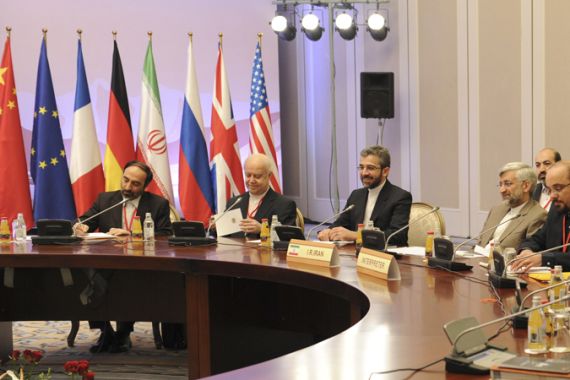Western powers hint at Iran sanctions relief
Negotiators suggest “several offers” for Western powers, which have proposed a modest easing of economic sanctions.

Iranian negotiators have hinted that they are prepared to make a new offer to world powers in talks over its nuclear programme, after the United States proposed limited steps to ease crippling economic sanctions against Iran.
A Western official described the first day of meetings in Almaty, Kazakhstan as “useful,” and said discussions will continue on Wednesday. This is the first round of negotiations in eight months between Iran and the so-called “P5+1” powers, meaning the members of the UN Security Council plus Germany.
“We have prepared our own offer with several different versions,” an Iranian source told the AFP news agency. “Which version we present depends on what the 5+1 put forward.”
The offer could include halting the enrichment of uranium to 20 percent, the source said, in exchange for a full lifting of international sanctions.
Western negotiators are unlikely to go that far, but they have proposed easing sanctions on gold and other precious metals if Tehran closes its underground Fordow enrichment plant.
‘Looking for flexibility’
After months of deadlock, and with Iran’s political elite preoccupied with presidential elections scheduled for June, few believe the meeting will yield a quick breakthrough.
“It is clear that nobody expects to come from Almaty with a fully done deal,” a spokesman for the European Union’s foreign policy chief Catherine Ashton, who oversees contacts with Iran on behalf of world powers, said shortly after talks started.
At best, diplomats and analysts say, Iran will take the joint offer seriously and agree to hold further talks soon on practical steps to ease the tension.
“We are looking for flexibility from the Iranians,” said Ashton’s spokesman, Michael Mann.
But Iran, whose chief negotiator Saeed Jalili is close to Ali Khamenei, Iran’s supreme leader, has shown no sign of willingness to scale back its nuclear work.
It argues that has a sovereign right to carry out nuclear enrichment for peaceful energy purposes, and in particular refuses to close Fordow, a condition the powers have set for any sanctions relief.
The facility is used for enriching uranium to 20 percent, which places it a short technical step from weapons-grade.
Iran’s stockpile of higher-grade uranium has grown to about 167kg, an increase of roughly 18kg since mid-November. While the pile is still approaching the level of 240 kg that Israel has set as its “red line”, the growth rate has slowed sharply.
Advanced centrifuges
A UN nuclear watchdog report last week said Iran was for the first time installing advanced centrifuges that would allow it to significantly speed up its enrichment of uranium, which can have both civilian and military purposes.
Tightening Western sanctions on Iran over the last 14 months are hurting Iran’s economy, slashing oil revenue and driving the currency down, which in turn has pushed up inflation.
The central bank governor was quoted on Monday as saying Iran’s inflation was likely to top 30 percent in coming weeks as the sanctions contribute to shortages and stockpiling.
But analysts say they are not close to having the crippling effect envisaged by Washington and – so far at least – they have not prompted a change in Iran’s nuclear course.
Israel, which for decades has had its own undeclared nuclear weapons programme, has threatened to attack Iran’s nuclear facilities if negotiations fail.